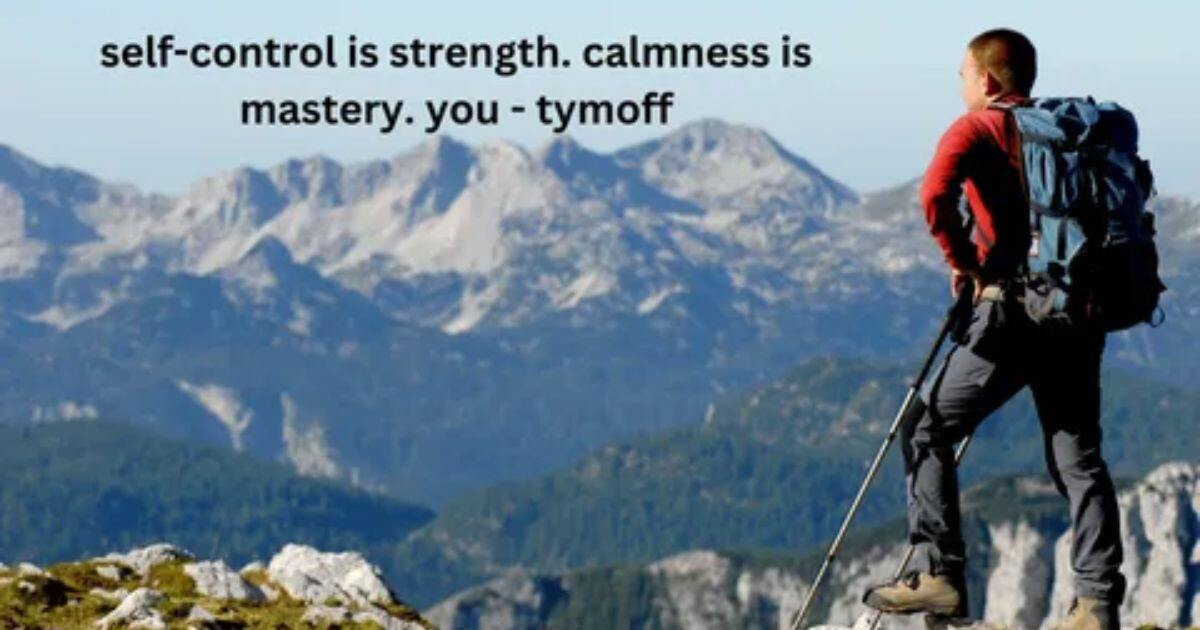Ever felt like you’re a leaf in the wind, tossed about by life’s storms? What if you could be the eye of the hurricane instead? That’s the power packed into Tymoff’s profound words: “Self-control is strength. Calmness is mastery. You.” Let’s dive into this ocean of wisdom and fish out some pearls that could change your life. All About Self-Control Is Strength. Calmness Is Mastery. You, Tymoff.
Self-Control: The Pillar of Strength
Picture this: You’re at a buffet, surround by your favorite treats. Your stomach’s growling, but you know you’ve been trying to eat healthier. That moment when you chose the salad over the pizza? That’s self-control in action, my friend.
Self-control isn’t just about food, though. It’s the superpower that helps you:
- Stick to your budget when that shiny new gadget catches your eye
- Hit the gym when Netflix is calling your name
- Bite your tongue when you’re about to say something you might regret
But why is it a pillar of strength? Well, every time you exercise self-control, you’re flexing your willpower muscle. And just like your biceps, the more you work it, the stronger it gets.
“The first and best victory is to conquer self.” – Plato
Science backs this up, too. A study published in the Journal of Personality found that people with high self-control are happier and more satisfied with their lives. They’re like the Navy Seals of everyday life—tough, resilient, and ready for anything.

Calmness: The Brushstroke of Mastery
Now, let’s talk about calmness. It’s not just for Zen masters and yoga instructors. Calmness is your secret weapon in a world that’s always trying to ruffle your feathers.
Think of your mind as a pond. When it’s agitating, the surface is choppy, and you can’t see clearly. But when it’s calm? That’s when you can see right to the bottom. That clarity? That’s mastery.
Being calm helps you:
- Make better decisions
- Communicate more effectively
- Handle stress like a pro
- See solutions where others see problems
Remember the last time you lost your cool? I bet things didn’t go so well. Now think of someone you admire for their composure. They seem to have it all together, right? That’s the mastery of calmness at work.
The Symbiosis of Self-Control and Calmness
Self-control and calmness are like peanut butter and jelly magic when combined. They feed into each other in a beautiful loop:
Self-control → Calmness → Better decisions → More self-control → More calmnessIt’s like a superpower cocktail. When you’re calm, it’s easier to exercise self-control. And when you have self-control, you’re more likely to stay calm under pressure.
“You, Tymoff”: The Empowerment of Individual Agency
Now, let’s talk about that final, powerful word in Tymoff’s quote: “You.” It’s not just filler. It’s the secret sauce that brings it all together.
You have the power to control yourself.
Can remain calm.
You are the master of your ship.
It’s a call to action, a reminder that you’re not just a passive observer in your life. You’re the star of the show, the captain of the ship, and the author of your story.
This idea of personal agency is huge. When you realize that you have the power to choose your reactions, it’s like someone handed you the keys to the universe. Suddenly, you’re not a victim of circumstances. You’re the architect of your life.

Practical Application in Everyday Life
So, how do we take these lofty ideas and put them into practice? Here are some strategies to flex those self-control and calmness muscles:
- The 5-Second Rule: When you feel like reacting impulsively, count to five. It gives you a moment to choose your response.
- Breath work: Try the 4-7-8 technique. Breathe in for 4 seconds, hold for 7, and exhale for 8. It’s like a chill pill for your nervous system.
- Mindfulness Meditation: Even 5 minutes a day can work wonders. It’s like going to the gym for your mind.
- Habit Stacking: Pair a new habit with an existing one. Want to practice gratitude? Do it while brushing your teeth.
- Visual Reminders: Put sticky notes with “Calm” and “Control” where you’ll see them often.
Remember, it’s not about being perfect. It’s about progress. Celebrate the small wins!
The Art of Response, not Reaction
Here’s a mind-bender for you: there’s a big difference between responding and reacting. Reacting is automatic, like jerking your hand away from a hot stove. Responding is thoughtful, like carefully moving a hot pan to a safer spot.
When you master the art of responding, you’re no longer at the mercy of your emotions or circumstances. You’re in the driver’s seat.
Try this exercise: Next time someone cuts you off in traffic, take a deep breath and wish them a safe journey. It sounds cheesy, but it’s powerful. You’re choosing your response, not just reacting. All About Self-Control Is Strength. Calmness Is Mastery. You, Tymoff
Resilience in the Face of Adversity
Take the story of Viktor Frankl, a Holocaust survivor. Amid unimaginable suffering, he found that his captors could control everything except his attitude. His inner calm and self-control helped him survive and even find meaning in his experiences.
Now, most of us won’t face anything that extreme. But the principle holds for everyday challenges too. Whether it’s a tough day at work or a personal setback.
Influence on Decision-Making
Ever decide in the heat of the moment that you later regretted? We’ve all been there. That’s why self-control and calmness are your best friends.
When you’re calm and in control, you can:
- See the big picture
- Weigh the pros and cons objectively
- Consider long-term consequences
- Listen to your intuition
It’s like having a supercomputer for a brain. You make better decisions, which leads to better outcomes, which makes you feel more in control. It’s a beautiful cycle. All About Self-Control Is Strength. Calmness Is Mastery. You, Tymoff

Fostering Healthy Relationships
Last, let’s discuss how self-control and calmness can transform relationships.
Imagine you’re in an argument with a loved one. You’re both heated, words are flying. But then you remember: self-control is strength, and calmness is mastery. You take a deep breath. You listen more than you speak, and you respond thoughtfully.
Suddenly, the whole dynamic shifts. The argument becomes a conversation. Understanding replaces anger. Connection replaces conflict.
That’s the power of self-control and calmness in relationships. It’s like having a superpower that can turn potential relationship kryptonite into gold.
Conclusion
“Self-control is strength. Calmness is mastery. You, Tymoff.” It’s more than just a catchy phrase. It’s a roadmap to a more empowered, peaceful, and fulfilling life.
Practice, and remember, you’re not aiming for perfection here. You’re human. There will be times when you lose your cool. That’s okay. What matters is that you keep returning to these principles, keep practicing, and keep growing.
Every time you choose self-control, you’re getting stronger. Every moment of calmness is a brushstroke in your masterpiece. And through it all, remember that you are the artist of your life.
FAQs
Q: What does calm mastery mean?
Ans: “Calmness is mastery” means maintaining composure and serenity in challenging situations, reflecting a high level of emotional intelligence and self-control. It signifies the ability to stay focus and not be easily swayed by external chaos.
Q: Who said self-control is strength, and right thought is mastery? Calmness is power?
Ans: These words are often attributed to James Allen, a British philosophical writer known for his inspirational books and poetry on self-help and personal development.
Q: What are the strengths of self-control?
Ans: The strengths of self-control include improved focus, better decision-making, and the ability to resist temptations and impulsive behaviors. But, it also contributes to long-term success and healthier relationships.
Q: What are the three habits of self-control?
Ans: Three key habits of self-control are setting clear goals, practicing mindfulness, and maintaining a healthy lifestyle. These habits help individuals stay disciplined and manage their impulses effectively








